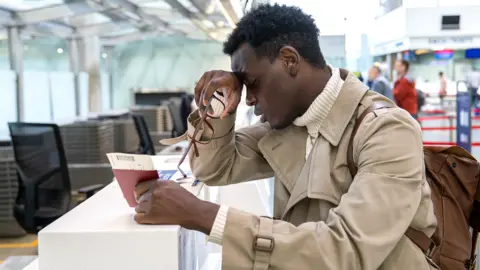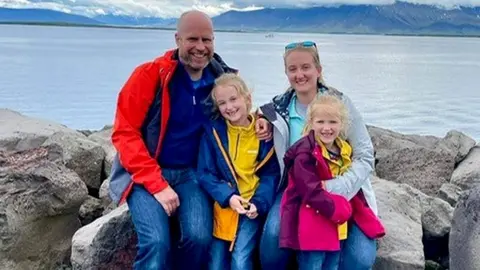Rail strikes and flight cancellations: Are UK travellers heading for a summer of misery?
 Getty Images
Getty ImagesFor travellers, the past fortnight has brought a tidal wave of bad news.
Cancelled flights, proposed rail strikes and record-breaking petrol prices have thrown people's plans into disarray - and now the peak summer holiday season and the long school break are hovering on the horizon.
After more than two years of Covid restrictions, this should be a summer of fun.
But are we now heading into a summer of misery?
We take a look at where things stand for planes and trains over the weeks ahead.
Planes
The UK air travel industry has just faced what is arguably its biggest test since coronavirus rules were lifted and it is fair to say, it has been a bumpy ride.
Over the Jubilee bank holiday, which coincided with many schools' half-term breaks, 750 flights out of the UK were cancelled, according to aviation data firm Cirium. Around 466 return flights were axed.
Although cancellations made up a small percentage of total flights, many passengers were only informed at short notice and faced long queues to check-in bags and get through security.
Staff shortages from job cuts made at the height of the pandemic have been driving cancellations and delays, heightening holidaymakers' anxiety that problems will continue into the key summer season.
Add to that the threat of strike action. British Airways workers have voted in favour of supporting industrial action, in a ballot conducted by the Unite union, while Ryanair is facing walkouts by staff in parts of Europe.
Jess Baker has been put off travelling abroad this summer after a recent "nightmare" 18-hour journey home from Iceland.
She, her husband Shaun and their two children had their EasyJet flight into Luton cancelled on Monday.
They were given the option to travel home on Thursday but needed to get back sooner so paid £1,000 to fly into Glasgow with Icelandair. They shelled out an additional £340 to hire a car to drive down to Luton to collect their own vehicle.
 Jess Baker
Jess Baker"It's been an absolute nightmare," says Ms Baker. "We quickly decided that we'll go camping here instead. It's not worth the hassle all over again."
Others may have the same idea. Sykes Holiday Cottages says it has seen a 22% rise in bookings in the past two weeks compared to the same period last year.
Chief executive Graham Donoghue says it is "at least in part due to widespread reports of overseas travel disruption".
"Travellers simply don't want to have to tackle airports and take the risk that their family holidays could be cancelled," he says.
Since cutting staff, airlines, airports and the companies that provide baggage handling have been recruiting but because new workers have to pass security checks, it takes time.
Heathrow airport's boss John Holland-Kaye recently told the Financial Times it could take up to 18 months for the aviation sector to "fully recover capacity".
Aviation consultant Chris Tarry tells the BBC the situation should improve as more staff are security cleared, but he warns there are "unlikely to be enough workers in certain areas given wages and working conditions".
And airports "only work if all of the elements are in place", he says.
Trains
Glastonbury Festival returns this year on 22 June, but it might not be that easy to get there now rail strikes have been announced.
More than 40,000 RMT Union members from Network Rail and 13 train operators are set to walk out after talks over pay and redundancies broke down.
The strikes are due to take place on 21, 23 and 25 June but it is likely services across the whole week will be disrupted. Train drivers are also going to hold their own strikes over pay.
Passengers have been advised not to travel on trains unless necessary during the strikes.
Zahid Fayyaz, a solicitor from Brixton who is planning to travel to Glastonbury by train, is worried about the impact the potential strikes might have.
 Zahid Fayyaz
Zahid FayyazHe originally had a ticket for 23 June but because of the planned strike on that day he and his two friends have bought new tickets to travel the day before. It cost them £240 and an extra day off work.
"It's going to take an extra two hours, but aside from this I'll be fine. But other people won't be able to take time off work or afford the extra money," the 40-year-old says.
Mr Fayyaz says he is broadly sympathetic to the rail workers striking, but believes the "timing is wrong".
Glastonbury Festival is one of several events impacted by potential travel disruption, along with a cricket test match between England and New Zealand in Leeds.
Some people are switching their mode of transport to buses and coaches. Chris Hardy, managing director of National Express, said the firm had seen an increase in enquiries and bookings during the days of the rail strikes.
The walkout could yet be called off if all parties can reach an agreement.
That's what John Kuehne, from Fort Lauderdale in Florida, is hoping for.
 John Kuehne
John KuehneHe's traveling to England along with many of his friends from around the world to see prog-rock legends Yes, who are performing at London's Royal Albert Hall on 21 June.
But "everything is up in the air" now, he says. "Car rentals, parking, fuel, tolls, and congestion zone fees make it very expensive and inconvenient."
Mr Kuehne also happens to be arriving in the UK just as the cost of filling an average family car hit £100 for the first time.
He says labour disputes happen but that "all sides need to come together quickly to find a reasonable solution".
"What they do in the next two weeks will affect the lives of thousands of people who just want the wonderful experience of modern British mass transit."
